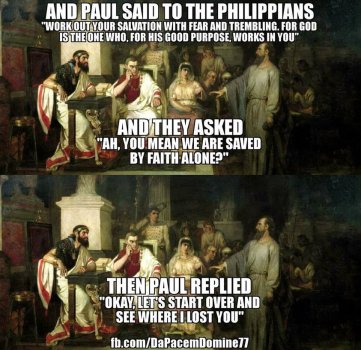I've already explained the false notion of the Pelagian heresy that you are repeating over and over again.
Already addressed, that you ignored.
Already addressed, that you ignored.
Already addressed, that you ignored.
Already addressed, that you ignored.
View attachment 47712
Your mind is closed.
Why your automatic disdain for the ECF??? Is it because your private views are misaligned with theirs??? I'm still waiting for evidence the ECF contradict scripture, which you haven't done. Just airhead generalizations.
No disdain for the ECF but concerned for their erroneous teachings on baptism-and you have NOT addressed the Scripture references I have given you-
1. John 1:12
"But as many as received Him, to them He gave the right to become children of God, to those who believe in His name."
This passage emphasizes receiving Christ and believing in His name as the means to become children of God.
2. John 3:36
"He who believes in the Son has everlasting life; and he who does not believe the Son shall not see life, but the wrath of God abides on him."
Belief in the Son is directly connected to having everlasting life, with no mention of baptism.
3. John 6:47
"Most assuredly, I say to you, he who believes in Me has everlasting life."
Jesus again underscores belief in Him as the key to eternal life.
4. Acts 10:43
"To Him all the prophets witness that, through His name, whoever believes in Him will receive remission of sins."
Peter speaks about belief in Jesus as the basis for the remission of sins.
5. Acts 13:38-39
"Therefore let it be known to you, brethren, that through this Man is preached to you the forgiveness of sins; and by Him everyone who believes is justified from all things from which you could not be justified by the law of Moses."
Paul preaches that belief in Jesus leads to justification and forgiveness.
6. Acts 16:31
"So they said, 'Believe on the Lord Jesus Christ, and you will be saved, you and your household.'"
Belief in the Lord Jesus Christ is presented as the requirement for salvation.
7. Romans 1:16-17
"For I am not ashamed of the gospel of Christ, for it is the power of God to salvation for everyone who believes, for the Jew first and also for the Greek. For in it the righteousness of God is revealed from faith to faith; as it is written, 'The just shall live by faith.'"
Paul asserts that the gospel is the power of God for salvation to everyone who believes.
8. Romans 3:21-22
"But now the righteousness of God apart from the law is revealed, being witnessed by the Law and the Prophets, even the righteousness of God, through faith in Jesus Christ, to all and on all who believe. For there is no difference."
Righteousness comes through faith in Jesus Christ to all who believe.
9. Romans 4:5
"But to him who does not work but believes on Him who justifies the ungodly, his faith is accounted for righteousness."
Faith, not works, is accounted for righteousness.
10. 1 John 5:1
"Whoever believes that Jesus is the Christ is born of God, and everyone who loves Him who begot also loves him who is begotten of Him."
Belief in Jesus as the Christ is linked to being born of God.
Conclusion
These scriptures reinforce the idea that faith in Jesus Christ is central to salvation. They collectively emphasize belief, faith, and receiving Christ as the means by which individuals are saved, justified, and granted eternal life,
without explicitly mentioning the necessity of water baptism in the context of salvation.
Paradoxical, ain't it? Now we can do this in a cordial, respectful manner, or forbear, meaning case closed.
J.
You HAVE to address the Scripture references without mentioning water baptism or even regenerative baptism, so far you are resorting to ad hominem not answering clearly and concisely
The Pelagian heresy, named after its founder Pelagius, was a theological controversy in the early Christian Church that centered on issues of original sin, human nature, and divine grace. Pelagius, a British monk who lived in the late 4th and early 5th centuries, taught doctrines that were later condemned as heretical by the Church. Here are the main points of Pelagianism and the reasons it was deemed heretical:
Core Beliefs of Pelagianism
Denial of Original Sin:
Pelagius argued that human beings are born innocent and without the stain of original sin inherited from Adam. He believed that Adam’s sin affected Adam alone and did not corrupt human nature or impose a sinful condition on his descendants.
Free Will and Human Ability:
Pelagius emphasized the importance of free will, maintaining that humans have the innate ability to choose good over evil without the necessity of divine grace. According to Pelagius, people could achieve moral perfection through their efforts and decisions.
Grace and Salvation:
While Pelagius acknowledged the existence of divine grace, he saw it primarily as a helpful aid rather than a necessity for salvation. He believed that grace facilitated moral improvement and supported human will but was not essential for overcoming sin or achieving salvation.
Role of Christ:
Pelagius taught that Christ’s role was primarily to provide a perfect example for moral living and to offer teachings that guide humanity. Christ’s sacrifice was seen more as a demonstration of love rather than a necessary atonement for human sinfulness.
Condemnation and Response
The teachings of Pelagius were met with strong opposition from many Church Fathers, most notably Augustine of Hippo. Augustine argued that Pelagianism undermined key Christian doctrines about sin, grace, and salvation. Key points in the condemnation of Pelagianism include:
Doctrine of Original Sin:
Augustine and other critics insisted that all humans inherit original sin from Adam, resulting in a fallen nature that inclines them toward sin. This doctrine underscores the necessity of divine grace for salvation.
Necessity of Grace:
Augustine emphasized that human free will is impaired by sin, and only through God’s grace can individuals be regenerated, overcome sin, and attain salvation. Grace is seen as indispensable, not merely an aid.
Christ’s Atonement:
Critics argued that Pelagianism diminished the significance of Christ’s atoning sacrifice, which they believed was essential for the redemption of humanity from the bondage of sin.
Key Councils and Declarations
Council of Carthage (418 AD):
This council formally condemned Pelagianism, affirming the doctrines of original sin and the necessity of divine grace for salvation. Several canons were issued, rejecting Pelagian teachings.
Council of Ephesus (431 AD):
The ecumenical Council of Ephesus further condemned Pelagianism and confirmed the earlier decisions of the Council of Carthage. It reinforced the orthodox position on original sin and grace.
Conclusion
Pelagianism was condemned as heresy because it contradicted the fundamental Christian doctrines of original sin, the necessity of divine grace, and the redemptive work of Christ. The heresy posed a significant theological challenge by suggesting that human beings could achieve righteousness and salvation through their efforts. The Church’s response, particularly through the writings of Augustine and the decisions of various councils, reaffirmed the necessity of grace and the transformative power of Christ’s atonement for salvation.
Even Ol' Pelagius was in error, and you want to attribute his error to me?



